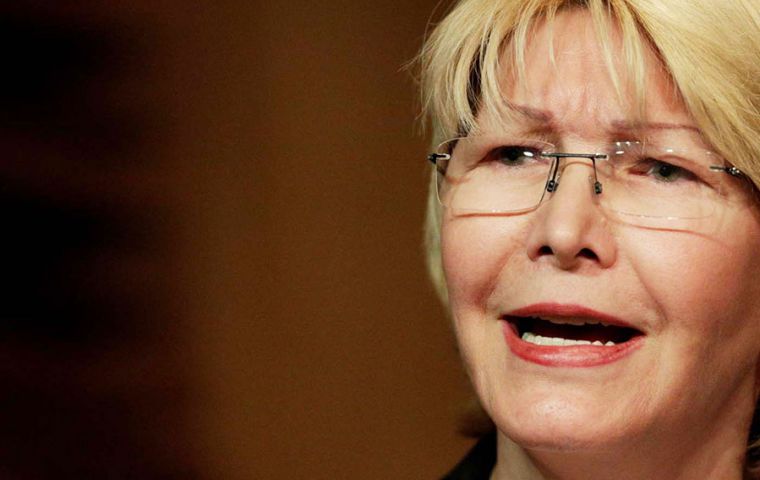MercoPress. South Atlantic News Agency
Maduro's assembly sacks dissident attorney general; next target elected members of the Legislative
 Ortega, a longtime Chavista loyalist vowed to continue defending the rights of Venezuelans from Maduro's “coup” against the constitution “with my last breath.”
Ortega, a longtime Chavista loyalist vowed to continue defending the rights of Venezuelans from Maduro's “coup” against the constitution “with my last breath.” The newly installed constitutional assembly ousted Venezuela's defiant chief prosecutor on Saturday, a sign that President Nicolas Maduro's embattled government intends to move swiftly against critics and consolidate power amid a fast-moving political crisis.
Cries of “traitor” and “justice” erupted from the stately, neo-classical salon were 545 pro-government delegates voted unanimously to remove Luisa Ortega from her post as the nation's top law enforcement official and replace her with a staunch government supporter.
They said they were acting in response to a ruling by the government-stacked Supreme Court, which banned Ortega from leaving the country and freezing her bank accounts while it weighs criminal charges against her for alleged irregularities.
Ortega, a longtime Chavista loyalist who broke with the populist government in April, refused to recognize the decision and vowed to continue defending the rights of Venezuelans from Maduro's “coup” against the constitution “with my last breath.”
“This is just a tiny example of what's coming for everyone that dares to oppose this totalitarian form of government,” Ortega said in the statement she signed as chief prosecutor. “If they're doing this to the chief prosecutor, imagine the helpless state all Venezuelans live in.”
Earlier Saturday, Ortega was pushed and barred from entering her office by dozens of national guardsmen in riot gear who took control of the entrance to the building.
She alleged that authorities were desperate to get their hands on dossiers containing information on dirty dealings by high-level officials, including sensitive details about millions of dollars in bribes paid by Brazilian construction giant Odebrecht.
Assembly delegates later swore in as her replacement Ombudsman Tarek William Saab, who was recently sanctioned by the Trump administration for failing to protect protesters from abuses in his role as the nation's top human rights official.
Members of the all-powerful constitutional assembly had pledged in their first meeting to move quickly against Maduro's opponents and didn't disappoint.
“Don't think we're going to wait weeks, months or years,” former Foreign Minister Delcy Rodriguez said Friday after she was chosen to lead the assembly. “Tomorrow we start to act. The violent fascists, those who wage economic war on the people, those who wage psychological war, justice is coming for you.”
s installation is virtually certain to intensify a political crisis that has brought four months of protests in which at least 120 people have died and hundreds more have been jailed.
Maduro also wants the assembly to strip opposition lawmakers of their constitutional immunity from prosecution, saying their constant conspiring to oust him shouldn't be protected.
While members of congress say they will only be removed by force, the opposition is struggling to regain its footing in the face of the government's strong-arm tactics and the re-emergence of old, internal divisions. Several opposition activists have been jailed in recent days, others are rumored to be seeking exile and one leader has broken ranks from the opposition alliance to say his party will field candidates in regional elections despite widespread distrust of the electoral system.
In a sign of its demoralized state, only a few hundred demonstrators showed up for a Friday protest against the constitutional assembly, one of the smallest turnouts in months.
An increasing number of foreign governments have refused to recognize the constitutional assembly, further isolating Maduro's government on the international stage.
Maduro responded by calling the move part of a dirty campaign led by the Trump administration to discredit Venezuela and get its hands on its vast oil reserves.
“They come walking down the middle of the street barking orders, treating rulers like their maids,” Maduro, told Argentina's Radio Rebelde in an interview.
The opposition boycotted the July 30 election for the constitutional assembly, saying the rules were rigged to further entrench Maduro's “dictatorship.”
The results have come under mounting scrutiny after the international company that provided the electronic voting machines said that “without any doubt” the official turnout had been tampered with — a charge dismissed by Maduro and the National Electoral Council.
The constitutional assembly is made up of delegates from an array of pro-government sectors such as trade unionists, students and even representatives of Venezuelans with physical disabilities. But the agenda is expected to be set by bigger-name loyalists, including Maduro's wife, son and several Cabinet ministers who resigned to join the body.
It will have sweeping powers to upend institutions and in theory could even remove Maduro, a fact held up by government supporters as a sign of its independence.




Top Comments
Disclaimer & comment rulesCommenting for this story is now closed.
If you have a Facebook account, become a fan and comment on our Facebook Page!